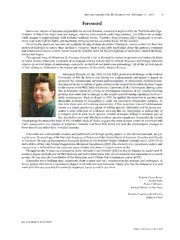Table Of ContentMem Inst Oswaldo Cruz, Rio de Janeiro, Vol. 108(Suppl. I): 1, 2013 1
Foreword
Insects are vectors of parasites responsible for several diseases, considered neglected by the World Health Orga-
nization. In Brazil the major ones are: dengue, malaria, leishmaniasis and Chagas disease. All of them are endemic
while dengue is hyperendemic with periodic epidemic bursts. Together, these diseases affect thousands of people
every year with high mortality and morbidity, bringing serious economic losses for the country.
No clinically approved vaccines are available for any of these disorders. Therewith, vector control has been the
preferred approach to reduce their incidence. However, there is still little knowledge about the genetics, evolution
and behaviour of insect vectors, which would be valuable tools for the development of alternative control methods,
always envisaged.
This special issue of Memórias do Instituto Oswaldo Cruz is devoted to studies on genetics and molecular basis
of insect vectors behaviour. It consists of 14 original articles and reviews written by Brazilian and foreign scientists
experts on several fields of entomology, especially on medical and molecular entomology. All of the invited papers
in this edition are dedicated to the honour and memory of Alexandre Afranio Peixoto.
Alexandre Peixoto (21 Jan 1963-10 Feb 2013) graduated in biology at the Federal
University of Rio de Janeiro and during his undergraduate and master’s degree he
analysed the chromosome inversion polymorphisms of Drosophila mediopunctata.
His interest in the evolution of genes related to the control of circadian rhythms began
in the course of the PhD, held in Leicester University (UK). Afterwards, during a post
doc at Brandeis University (USA), he investigated mutations in ion channel-forming
proteins that could lead to changes in the sounds emitted during copulation in Droso-
phila melanogaster. Back to Brazil in 1997, he applied the expertise in genetics and
MBERG BRITO mtvheoactlt eotcirmu ilsea rat hesevinroegl ulwet iaosspn es tociifle l Dsa orsort sraoo pnghgro icluaop nt ootrf o ssvtiuebdrlsiyny g tih fse pt heLicusi teAzso.m mAeylrieiacx aalnon ndvgrieisp caaenlrpdail s hl iecsio sghmrmopulaepnx ip.a rsAeis-t
GUTE sented a solid collection of evidences showing that Lu. longipalpis is indeed part of
OTO BY a complex with at least seven species. Similar strategies helped to delineate part of
PH the Anopheles cruzii and Rhodnius prolixus species complexes. In parallel, he started
investigating the molecular basis of the circadian clock of Aedes aegypti (the main dengue vector in Americas) and
Culex quinquefasciatus (vector of lymphatic filariasis and West Nile fever) and how the physiological changes in
these insects can affect their vectorial capacity.
Alexandre was a remarkable scientist and published over 80 high quality papers in international journals, includ-
ing Science, Proceedings of the National Academy of Sciences of the United States of America, Genetics and Trends
in Genetics. He was an International Research Scholar of the Howard Hughes Medical Institute twice (2002-2012)
and a fellow of the John Simon Guggenheim Memorial Foundation (2003). His research was considered creative and
visionary as it differed from the common sense of what was done in insect vectors so far.
Throughout the 16 years as a researcher at the Oswaldo Cruz Institute (IOC) in Rio de Janeiro, he supervised 18
master’s degree students and 14 PhD students and had collaboration with diverse national and international research
groups. He was also the Coordinator of the Molecular and Cellular Post-Graduation course at IOC.
Alexandre was a brilliant man, passionate about science and very supportive to his students and colleagues. A
lovely person who leaves a tremendous legacy to be followed and honoured. Those who had the honour to live and
work with him are sure that his untimely departure leaves a void in our lives.
Rafaela Vieira Bruno
Denise Valle
Pedro L Oliveira
Invited Editors for this issue
Ricardo Lourenço-de-Oliveira
Editor in Chief
doi: 10.1590/0074-0276130585
online | memorias.ioc.fiocruz.br

